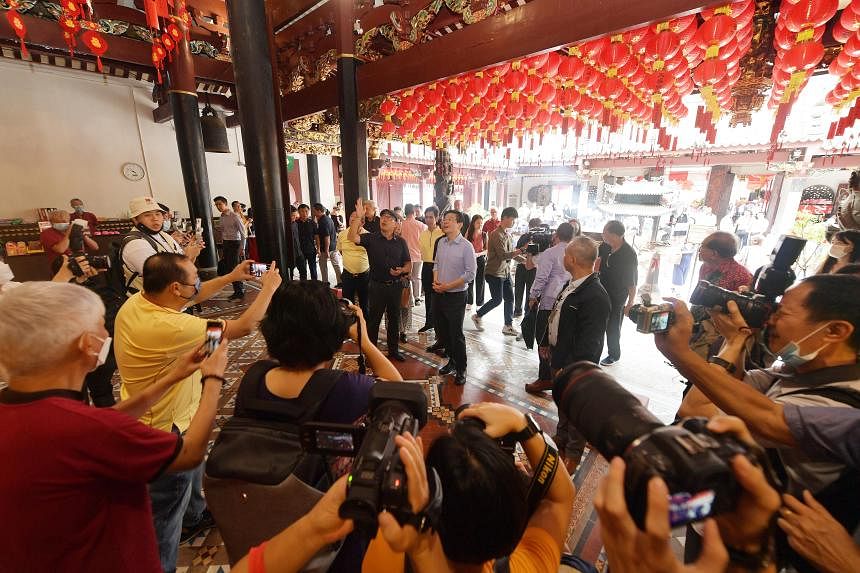SINGAPORE - Local Chinese have developed a distinctive culture and identity in Singapore’s multiracial and multicultural society, and they must be preserved and passed on to future generations, said Deputy Prime Minister Lawrence Wong.
A new app that allows users to virtually tour the historic Thian Hock Keng temple – a symbol of Hokkien culture and history – is a good way to get more people, especially the young, to learn about their heritage, said Mr Wong, who launched the app at the opening of the Singapore Hokkien Festival on Friday.
The temple in Telok Ayer Street is a centuries-old national monument and sits opposite the Singapore Hokkien Huay Kuan (SHHK) Building Plaza, where the festival is being held.
“I would like to praise the Thian Hock Keng temple for using technology to allow more people, especially the younger generation, to learn more about the temple’s history and architecture,” he said in Mandarin.
Thian Hock Keng, one of the oldest and most important Hokkien temples in Singapore, was visited by Chinese immigrants who gave thanks to Mazu (Goddess of the Seas) for their safe voyage. Led by early pioneers like philanthropists Tan Tock Seng and Si Hoo Keh, the Hokkien clan built the temple in 1839. Managed by SHHK, the temple was gazetted as a national monument in 1973.
Mr Wong, who is a Hainanese but speaks Hokkien as his mother is a Hokkien, said the Hokkien pioneers have made many contributions to Singapore’s economy, education and social welfare.
“While there may be challenges ahead, we will be able to overcome them if we continue to stay united, work hard and adopt the early pioneers’ fighting spirit and sense of social responsibility,” he said.
In its seventh edition, the biennial festival from Dec 2 to 4 is organised by SHHK and supported by Fujian-related clan associations, affiliated schools and subsidiaries.
Themed Being Hokkien: Heritage · Culture · Food, it features local Chinese and Hokkien cultural performances and Hokkien food like oyster mee sua, yam porridge and shrimp rolls. There is also an exhibition showcasing artefacts from the Heng San Teng Temple in Silat Road which was destroyed in a fire in 1992.
The Hokkien community – the largest Chinese dialect group here – traces its ancestry to Fujian province. There are an estimated 1.2 million to 1.4 million Hokkiens in Singapore, said SHHK.
SHHK president Thomas Chua said the festival is a platform to preserve and promote Hokkien culture, and to let the younger generation better understand their heritage. He added that it is heartening to see younger members joining SHHK and its activities.
SHHK, which has more than 5,000 members, told The Straits Times that over 94 per cent of its new members are aged between 31 and 50. More than 2 per cent are even younger.
The opening ceremony featured wushu and song performances by SHHK pre-schoolers, including six-year-old Addah Wu.
Her mother, Mrs Audrey Wu, who works in the banking sector, said it was important to expose Addah and her four-year-old brother Darrius to Hokkien culture from a young age.
The 36-year-old, who is Hokkien, said: “It’s something that many from the younger generation have lost touch with, so I made it a point to develop their interest in it.”


